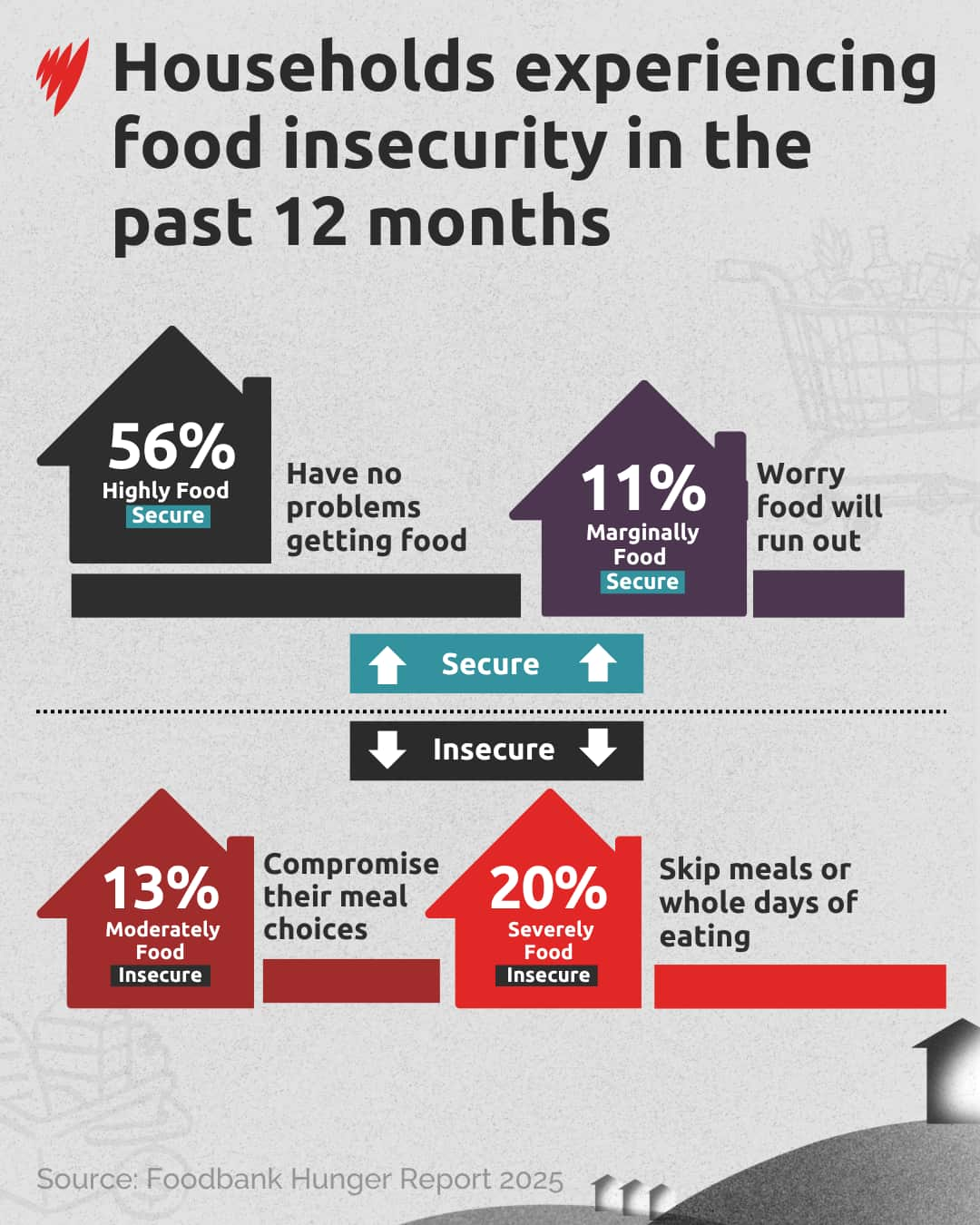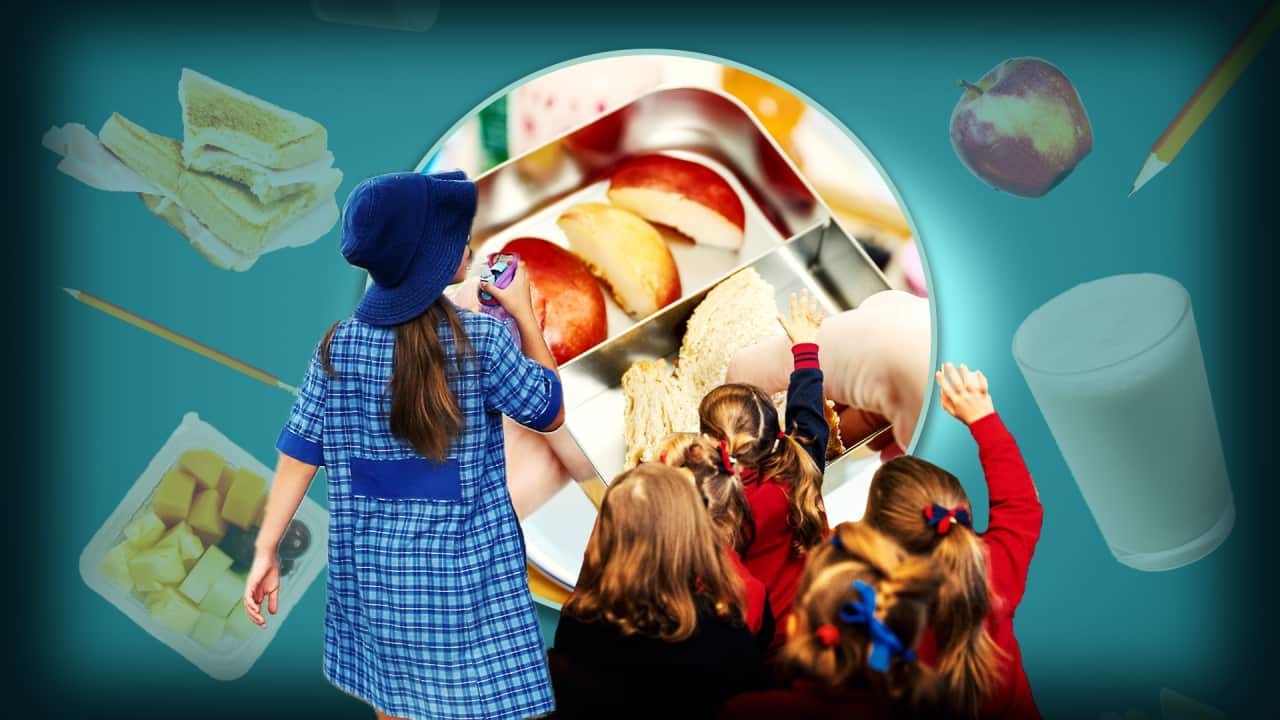Key Points
- More Australians than ever before are relying on food relief charities, reports find.
- The charity sector is struggling to meet demand from schools for support with meals and supplies.
- A childhood development expert says a lack of food or essential items can impact a child for life.
Overwhelmed charities say more Australian children could be dropping out of school as poverty-induced meal-skipping hits a growing number of families.
Food relief charity OzHarvest has been running for 21 years, but says 2025 is the worst on record when it comes to food insecurity.
NSW state manager Richard Watson told SBS News that meeting growing demand is a "daily challenge".
"Food insecurity in Australia is often overlooked — we describe it as a hidden crisis that is affecting so many families right now," he said.
"Children are arriving at school tired and unfocused, families are stressed about how to stretch their budgets, and others [are] going without because they're prioritising other bills."
OzHarvest delivers more than 700,000 meals across Australia to 1,550 charities, many of which are "stretched to their limits", Watson said.
"Our latest Community Needs Survey revealed a 54 per cent increase in people being turned away from charity doors, as frontline organisations struggle to meet the ongoing high demand."
'Demand so high' some schools turned away
A key sector accessing food relief is educational institutions, with OzHarvest working with 245 schools, TAFEs and colleges across the country.
One program providing food relief for students is called Nourishing Schools, and it's organised separately through OzHarvest Western Australia.
The program's coordinator, Tim James, works with volunteers to pack 280 hampers each week as demand for the program grows in Perth and regional WA.
"We started off at about 24 schools and then the demand is so high, we've got more and more schools wanting to come on board," he told ABC Radio Perth.

Through the Nourishing Schools program, OzHarvest supplies fresh groceries and healthy snacks to schools for breakfasts and lunches, and also delivers pantry items for families.
The program supports over 140 schools, with many others being added to a waitlist.
"We try not to turn schools away, but we do have schools that are applying more recently that we just say: 'I'm sorry, we just don't have capacity, if we have the opportunity, then we'll get back to you'," James said.
"The waiting list is growing, and we don't have great options in the immediate future of how we're able to include more schools."
While food security is a national challenge, Watson said it's most acutely felt in low-income and regional areas.
"These schools often rely on food relief to ensure their students have access to regular, nutritious meals both at school and in the form of hampers to provide much-needed food for their household", he said.
Children missing more than just meals
Doug Taylor, CEO of The Smith Family, said more and more schools are trying to provide core support to students through meals and supplies.
The national children's education charity supports 73,000 disadvantaged students across Australia in 800 schools.
60 per cent of parents from these families found it hard to afford essential school items this year, according to a survey.
"There are increasing costs for school items, excursions and books and school uniforms, all of which are really important," he said.
"We often underestimate how important it is to have a school uniform like your peers in terms of being a part of the school community."
Taylor also said a "new frontier of poverty" is creating disadvantage in the classroom, as around 44 per cent of disadvantaged students don't have access to laptops at home.
"Many schools these days will have bring-your-own-device policies, which is great for young people's learning, but it's really challenging for families that don't have access."
Taylor explained that poverty and disadvantage can also increase absenteeism and contribute to children dropping out of school.
"Our school completion rate is at a historic low," he said.
"While some of that has to do with COVID-19, there are factors like mental wellbeing and disadvantage also contributing to that."
Data from NAPLAN results show that a young person who experiences disadvantage — "not having access to those educational essentials" — can be four to five years behind their peers in literacy and numeracy, he added.
Importance of nutrition, school supplies
Dr Hannah Kirk, a developmental psychologist and senior lecturer at Monash University, said children need "adequate nutrition" to maintain brain health.
"The brain uses a huge amount of the body's energy and needs to be fuelled accordingly," she told SBS News.
"Skipping meals leads to reduced glucose availability and can impact neural systems that support key cognitive processes such as attention and working memory.
"Without these foundational skills that allow us to concentrate and remember information, it is very challenging to acquire new knowledge and skills."
Kirk explained that being hungry at school can cause irritability and dysregulation that impacts classroom engagement.
"Nutritional inadequacies are associated with increased illness, poorer sleep, and reduced physical exercise, all aspects that can contribute to poorer development and increased school absence."
A lack of supplies can also lead to social exclusion and reduced self-esteem as children may feel embarrassed or different, which can lead to social withdrawal and reduced "socio-emotional development".
Kirk said that educational engagement plays a "huge role" in children's developmental trajectories.
"Early disengagement from schools can lead to reduced skill development and restrict later employment opportunities, as well as elevating the risk of involvement with the justice system.
"It is therefore crucial that children's engagement with education is prioritised."
For the latest from SBS News, download our app and subscribe to our newsletter.

